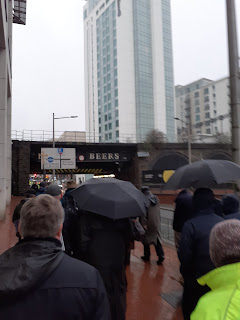I was at two different protests recently. Both were in the middle of Cardiff, and both at points were on exactly the same routes. One was a protests, organised by the Cardiff People's Assembly, protesting the cost of living crisis. The other was a procession between two Anglican churches in Cardiff as an act of witness to pray for peace in Ukraine.
Now of course those issues are very different, but at the same time it really struck me that I seemed to be the only person who was at both of these different events. Both in the middle of Cardiff, both virtually in the same place, just a few days apart. I was the only person at both the left wing cost of living protest, and the Christian pray for peace in Ukraine event.
It really got me pondering - why do I often feel like I'm the only person who goes to these different things? Why is there so little crossover?
Now these are two separate things. But I also find it hard to believe that people who care about the cost of living don't also care about peace in Ukraine, and that people who care about peace in Ukraine don't also care about the cost of living crisis. So I'm left puzzling about why I was the only person (as far as I could see) at both of these events.
I think part of the answer is that these things happen in silos. There's the left wing activist community silo and the (mainstream) Christian community silo. And never the twain shall meet.
But it's not just that. The reality is that people will often go to events organised by their own organisation, but won't go to events organised by other organisations. So if Anglican Christians create an event led by Anglican Christians praying and protesting for peace in Ukraine, then Anglican Christians, people in those networks will turn up to it. And yet if you organised an event not lead by those people, probably people wouldn't turn up. In fact they probably won't even know about it.
Extinction Rebellion people turn up at Extinction Rebellion events. Friends of the Earth people turn up at Friends of the Earth events. Muslims turn up at Muslim events. Christians turn up at Christian events. Socialists turn up at socialist events. Trade unionists turn up at trade union events. Everyone wants everyone else to turn up to their events, but they are less likely to turn up to other organisations' events.
Why? Well sure, there are only so many hours in the day, and you have to discern what to give your energy to. And you also have to work out if you feel like you will be comfortably welcome in some spaces. Black people and people of colour have to decide if they have the energy to turn up in mainly white spaces. And we all have to make those kinds of decisions.
But I also think there's something of organisational ego, or sectarianism going on here. I want my organisation's event to be successful, because then I/we will feel successful. I'm not saying people don't have good intentions as well. I'm noticing these thought patterns in myself as well. We're all a mix of different motivations, aren't we? I am accountable for what I do, professionally, and the fact is, if I produce a report that says "I organised and event and X people turned up" that sounds much better than "I attended/supported someone else's event and X people turned up." I feel better. My organisation feels better. I feel like I'm achieving something.
But are we achieving much, each operating in our different silos? Ralph Waldo Emerson said, "There's no limit to what can be accomplished if it doesn't matter who gets the credit."
The opposite of that is that maybe we're not accomplishing what we need to because we are pre-occupied with who gets the credit.
How do we get better at networking? At bringing together all groups fighting for a better world? Sure, we won't all agree on everything, but can we agree on enough to achieve more? Can we at least communicate better, so we know about everything going on?
Can we step back and ask - what are we aiming for, and how can we collectively get there? How could we build peace and justice in our city and in the world in a collaborative way?
Maybe this sounds like a recipe for more meetings. That would be a depressing conclusion. There's no easy answers but perhaps part of the solution is not to exist in social silos. Maybe if we just were friends with each other, we would know what's going on in each other's communities and feel more like supporting each other. Maybe if the Christians were friends with the socialists it would make a difference (and you can of course, be both - I am!, but perhaps we often operate in primarily tribal ways in the circles we move in). Maybe if the environmentalists were friends with the trade unionists. Maybe if the anti-nuclear activists were friends with the anti-poverty activists.
Perhaps that is naive. But I just hope for a time when I don't feel like I'm the only one who goes to different types of protests/events, where it all feels more networked, more connected.

Comments